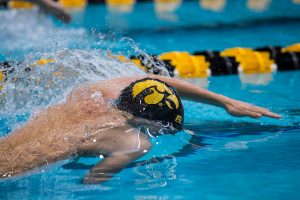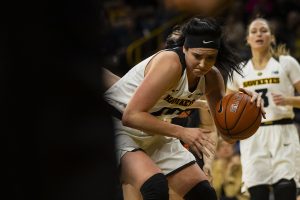Iowa City Olympic Weightlifting Club brings strength to the city
The Iowa City Olympic Weightlifting Club brings fiery competitors together.
A club member squats during a practice session for Got Strength powerlifting club at the Robert A. Lee Recreation Center in Iowa City on Thursday, February 28, 2019. Got Strength was started by Coach Phil Johnson in 2005 and was held in his privately owned gym. The club moved in 2017 when it began working with the Iowa City Parks and Recreation Department. (Wyatt Dlouhy/The Daily Iowan)
March 5, 2019
“The cameras are here, that means we’re gonna have a heavy lifting day.”
That’s what Phil Johnson told his Olympic weightlifting club at the beginning of its Feb. 28 training session, and while the club patrons exchanged smiles with Johnson, he meant what he told them.
The Iowa City Olympic Weightlifting Club is a USA Weightlifting-sanctioned club that has operated since 2005. The club works with the city Parks & Recreation Department and holds sessions in the Robert A. Lee Community Recreation Center.
The club has upwards of 35 members, from regulars who rarely miss a session to athletes who use the club as an opportunity to better their weightlifting in the offseason. The team meets three times per week, with weekday sessions on Tuesday and Thursday beginning at 5 p.m. and a Sunday session at 11:30 a.m.
Team members will also have the opportunity to compete in certain national or regional competitions a couple times over the course of a year.
Johnson, who runs the club, is a University of Iowa graduate who was a member of the school’s health and human physiology program as an undergraduate. He has traveled across the country learning about athletic training and weightlifting, but his first teacher just happens to be someone Hawkeye fans are quite familiar with.
“My earliest mentor in this business was Chris Doyle,” Johnson said. “When I think of Coach Doyle, I think of a genius, an artist. Obviously, people have seen what he’s done with the football program, and people think the success he’s had is because of the lifts or the exercises he has his players do. That really accounts for about 10 percent of it. The rest is his ability to communicate with his athletes and the culture he has created. That’s what he taught me, and that’s what we do here.”
Johnson and Doyle have maintained a relationship, and Doyle has kind words about Johnson’s current operation that he expressed on the club’s website.
“Phil has the knowledge, experience and enthusiasm,” Doyle said on the site. “He’s got everything you need to reach your performance goals. I highly recommend his training program.”
The culture Johnson has created in his club is not meant only for experienced weightlifters, however. There are three tiers in the club: start-up, transitional, and advanced. The tier a member is in will depend on age, strength, and weightlifting experience.
“When we get new members, we aren’t looking for any certain demographic,” Johnson said. “We are just looking for people who are passionate about this sport and are willing to work hard. We’ve had members of all ages, some as young as 7 years old. Even at that stage, we can start them out right, teach them the fundamentals, and if they fall in love with the sport, they will accelerate from there.”
The club member with the longest history with Johnson is Sam Weaver — the two go back to when Weaver was in junior high. For the past two years, Weaver has reunited with Johnson.
“In high school, I decided to stop lifting, but the past couple years, I’ve started to get back into it through this club,” Weaver said. “Now, I just keep coming back and can’t get enough. Phil is a great guy who knows what he’s doing, he knows how to teach you. All around, this is a great environment and a cool thing to be a part of.”
On the flip side, a relatively new member to the team agrees with Weaver.
“I had been lifting weights for several years before joining, and Phil got in contact with me and asked if I’d like to be a part of this club,” said Kally Potter, who has been with the club since January. “I had always lifted on my own before, but getting in the weight room here and being in this atmosphere, it became even more addicting. It’s a great place to train, and every time I leave, I can’t wait to come back.”
While some clubs may have an occasional drive for their area of interest, a common theme among weightlifting-club members is a burning passion for what they do.
“We call it practice rather than training,” Johnson said. “It’s practice like in any other sport, we come in and work on our craft, and we love it. It’s an addicting thing to be involved in; you’ll just keep coming back for more.”






